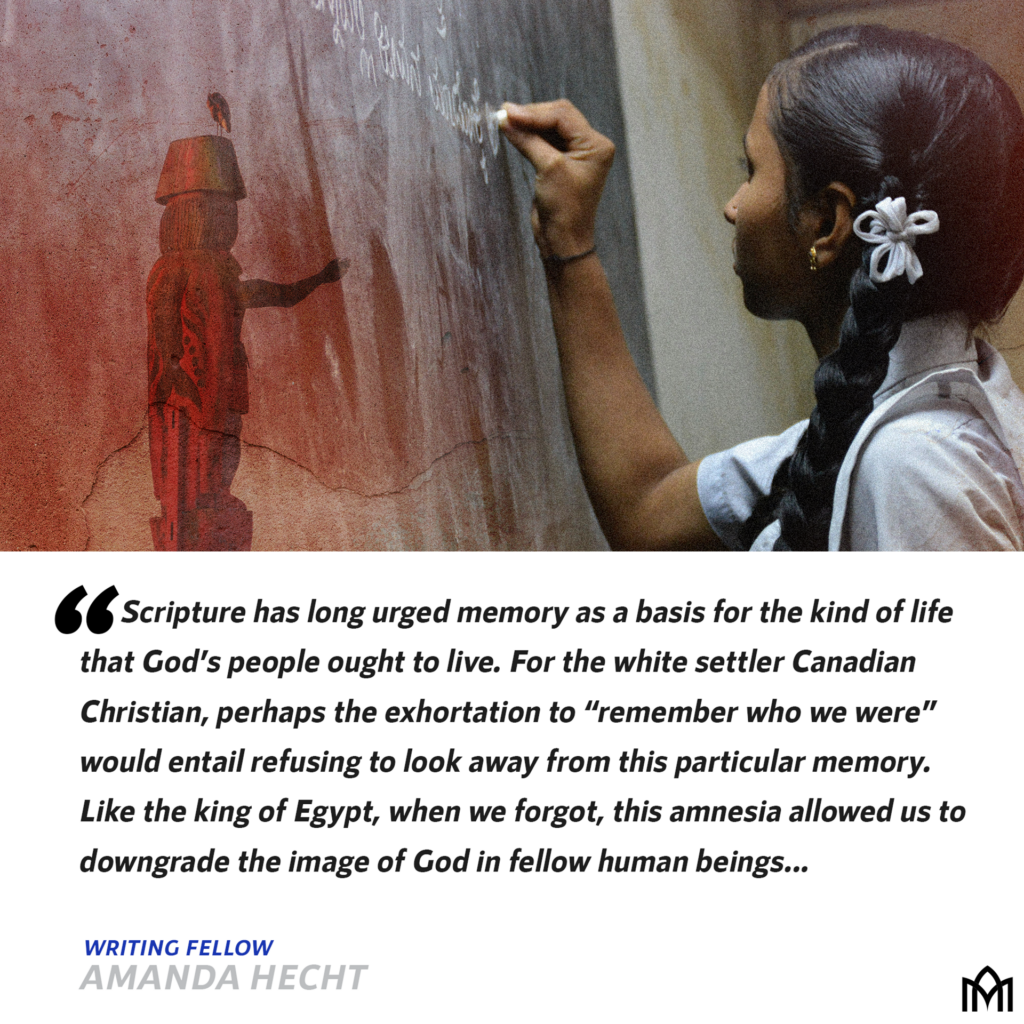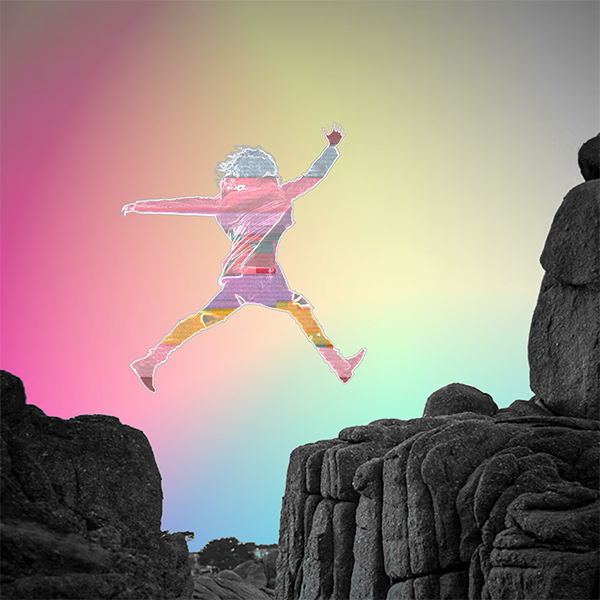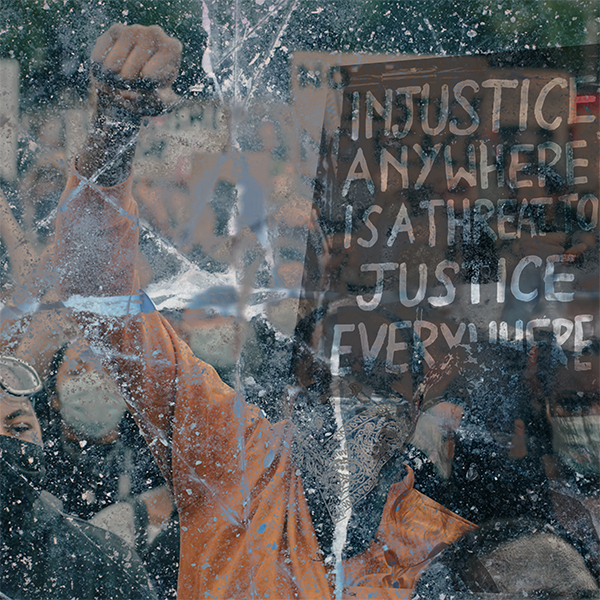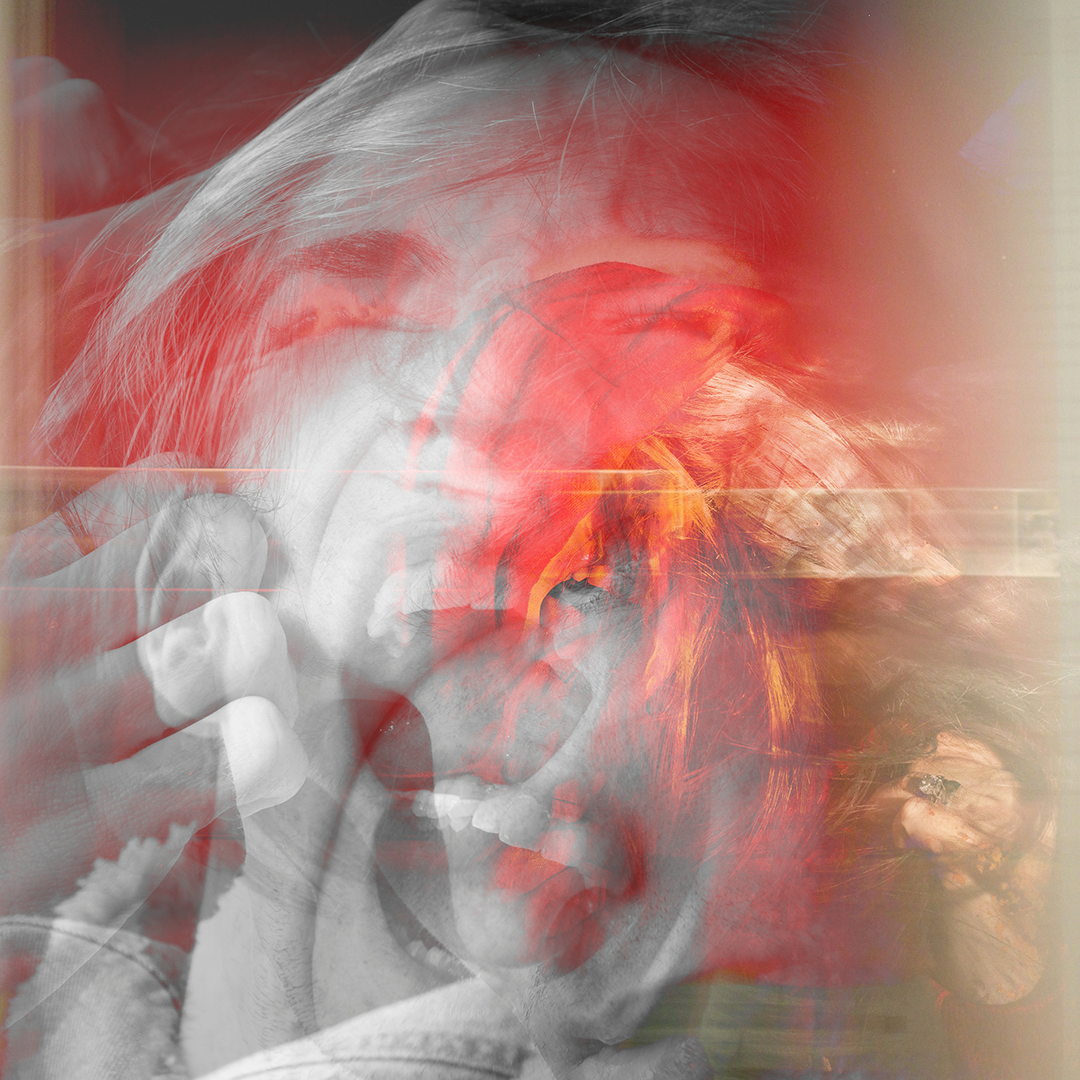Remembering For the Sake of Our Souls
Abstract: Scripture exhorts us to remember who we were so that we can live out our faith in the present day. For the white settler Canadian Christian, living our faith in Jesus Christ with integrity here and now requires that we remember the historical actions undertaken by Christians and the church in Canada (particularly, but not limited to, participation in the Residential School System).
In her book, Race & Rhyme: Rereading the New Testament, theologian Dr. Love Lazarus Sechrest writes about a method of biblical interpretation that “involves a disciplined attempt to find the ‘rhyme’ between contemporary issues and biblical texts.”1Love Lazarus Sechrest, Race & Rhyme: Rereading the New Testament. Grand Rapids, MI: Wm. B. Eerdmans Publishing Co., 2022, 2. In 2021, Canada declared September 30th the National Day For Truth and Reconciliation (colloquially known as “Orange Shirt Day”) a nationwide holiday2See https://en.wikipedia.org/wiki/National_Day_for_Truth_and_Reconciliation for more information. for all Canadians. As we approached this national holiday in 2024, I find a haunting “rhyme” between my time and place and the location of the Hebrew people when the curtain opens on the book of Exodus:
“Then a new king, to whom Joseph meant nothing, came to power in Egypt” (Exodus 1:8).
With these ominous words, the action in Exodus begins. When Joseph was forgotten, the Hebrew people lost their humanity in the eyes of Egypt, making them into a danger to be feared and a threat to be eliminated. And this seed, sown in the mind of Egypt’s king, blossomed into his systemic campaign of eliminating the Hebrew people entirely. In other words: the horror the Hebrew people lived in Egypt began when the king forgot, and everyone else simply “moved on.”
Memory is crucial to our faith. But sometimes memory is difficult. In this story from Exodus, I see a “rhyme” with a recent event in the Canadian news cycle. In May 2021, the entire nation of Canada (where I live, work, and minister) was rocked by the release of a report by the Tk’emlups te Secwépemc First Nation, the preliminary findings of its investigation stating that they had located the suspected grave sites of 215 children, some believed to be as young as three years old, on the site of an Indigenous residential school in Kamloops, British Colombia.3For reference on this discovery and the developments since, see the article: “‘Deeply disturbing:’ 3rd Anniversary of 215 suspected unmarked graves found in Kamloops” by News Staff. Published May 27, 2024, updated May 28, 2024. https://vancouver.citynews.ca/2024/05/27/215-unmarked-graves-kamloops-three-year-anniversary/. Since then, First Nations across the country have located evidence of the remains of more than 2,300 suspected unmarked graves at the sites of former residential schools and Indian hospitals.4As reported by Moira Wyton, CBC News in the article “Residential school denialists tried to dig up suspected unmarked graves in Kamloops, B.C, report finds.” published June 16, 2024, updated June 17, 2024: https://www.cbc.ca/news/canada/british-columbia/denialists-tried-to-access-unmarked-gravesite-tkemlups-report-1.6879980.
Although this knowledge hit the consciousness of Canadians in general (and me specifically) with the publication of this report and the resulting news headlines, resulting in shock and outrage, this was a truth long known by the Residential School survivors and other knowledge keepers who spoke on record during Canada’s Truth and Reconciliation Commission (TRC) hearings.5See, for instance, “Where Are The Children Buried” by Scott Hamilton, https://ehprnh2mwo3.exactdn.com/wp-content/uploads/2021/05/AAA-Hamilton-cemetery-FInal.pdf. It was confirmed through other records kept from Residential Schools. The story was there all along for us to read plainly in the reports produced by TRC hearings.
I was astonished when the news hit the airwaves. However, I had no right to be. The knowledge of our collective inaction was there, if any of us had dared to look. Instead, we, like the new king of Egypt, preferred to forget.
In the aftermath of these news stories, Brian Doerksen and Cheryl Bear wrote these evocative lyrics as a communal lament, 6Brian Doerksen and Cheryl Bear, “215,” lyrics © Doerksen Music Inc, September 2021. in which I find my own pained expression:
“Why did it take so long?
Revealing this ancient wrong
The elders spoke but we refused to hear
The church and the government
Complicit in violence
How could something so evil happen here?”
© Brian Doerksen and Cheryl Bear, “215“
And, even more heartrendingly honest, this lyric:
“We’re Christian and Canadian, yet now ashamed of both.”7Ibid. If you wish to watch a video of this music video performed by various Christian and Canadian artists, you will find it here: https://www.youtube.com/watch?v=1JI857KO3OE, embedded below.
Memory is crucial to our faith. But sometimes memory is difficult. The knowledge of our collective inaction was there, if any of us had dared to look. Instead, we, like the new king of Egypt, preferred to forget. Share on X
I have long wrestled with the legacy of the revelations about the horror of the Residential School system (and, of course, the other deeply disturbing events about the colonization of Canada) and how it impacts and informs my Christian faith. I cannot escape the painful fact that people who look like me, read the same Scriptures that I read, and sing many of the same hymns that I choose for my congregation on a Sunday morning, still participated in the perpetration of the Residential School system. And yet, the Canadian Government handed over operation of these schools to many church groups and denominations, even one that was associated with my own denominational expression.8The Catholic and Anglican denominations in Canada were the most heavily implicated in running of the Residential Schools. However, other denominations are not guilt free. There was a Baptist Residential School in operation from 1947 to 1960. Whitehorse Baptist (Lee School) is documented on the memorial website of the National Centre for Truth and Reconciliation. See https://nctr.ca/residential-schools/northern/whitehorse-baptist-lee-school/. This system, which from my perspective in history appears to be completely evil, was run by Christians who clearly did not see the problems with it that we do today.
This terrifies me.
Somewhere along the way, people who acted in the name of and under the auspices of my Lord and Savior, Jesus Christ, forgot that everyone who walks the earth bears the Image of Creator God. Somewhere along the way the Christian Church adopted a group of philosophies which has become known as the “Doctrine of Discovery,” which allowed European Christians to freely take land that they came across, and even in some cases, to kill the inhabitants of that land because they were considered to be an “inferior” race. This warped theology enabled Christians in Canada to run these Residential Schools, or at very least, ensured that they did not speak up or act in opposition of them.
What’s more, I cannot attribute the ability to see this as an evil to any superior spirituality of my own. I cannot be at all certain that, had I lived at that time, that I would have seen it for the evil it was and refused to participate, or worked to dismantle it.9In fact, I did live “at that time,” as the last Residential School in Canada closed either in 1996 or 1997. I graduated from High School in 1996. It is only my vantage point in history that allows me to see what was not clear to those who came before. It is only when we were forced to remember where and who we have been that we can begin to walk in a way that is more in line with our faith as followers of Jesus.
Somewhere along the way, people who acted in the name of and under the auspices of my Lord and Savior, Jesus Christ, forgot that everyone who walks the earth bears the Image of Creator God. (1/2) Share on X
Somewhere along the way the Christian Church adopted a group of philosophies which became known as the 'Doctrine of Discovery,' allowing European Christians to freely take land, even killing its 'inferior' inhabitants. (2/2) Share on X
Scripture has long urged memory as a basis for the kind of life that God’s people ought to live. For the white settler Canadian Christian, perhaps the exhortation to “remember who we were” would entail refusing to look away from this particular memory. Like the King of Egypt, when we forgot, this amnesia allowed us to downgrade the Image of God in fellow human beings, which in turn led the way to the attempt to systematically eradicate Indigenous peoples and Indigenous cultures. It would be far more comfortable for us to stay in that naïveté, to continue to slumber through the push of the moment which forces us to wrestle with this past. To remember will require that we search our souls, that we do not disengage, and that we work as hard as we possibly can to walk as far as we possibly can down the road of repentance.10Although we often associate repentance with feeling shame about something we’ve done, the biblical word carries a sense of turning around and walking a new, different, and better path.
And so, since remembrance is crucial to the practice of our faith today, I must rail against the loss of our collective memory for the sake of my soul, and of my confession of faith in Jesus Christ. Memory is an essential practice to live out the Christian faith with integrity. For it is only in the commitment not to continue to cover up this haunted past that we who are white settler Canadian Christians can begin to walk in a different way.
May we become different people: that we might move closer to healing relationships with Indigenous peoples, and that we might journey closer to the heart of the God that we worship, whose coming into the world was intended to tear down the dividing wall of hostility between all people groups (Ephesians 2:14).
///
Our collective amnesia allowed us to downgrade the Image of God in fellow human beings, which in turn led the way to the attempt to systematically eradicate Indigenous peoples and Indigenous cultures. (1/3) Share on X
It would be far more comfortable for us to stay in that naïveté, to continue to slumber through the push of the moment which forces us to wrestle with this past. (2/3) Share on X
To remember will require that we search our souls, that we do not disengage, and that we work as hard as we possibly can to walk as far as we possibly can down the road of repentance. (3/3) Share on X
*Editorial Note: Mandi’s first piece for Missio Alliance as a 2024 Writing Fellow was a profound exploration of hospice wisdom for a church in decline. Stay tuned for more from her later this year! ~CK




